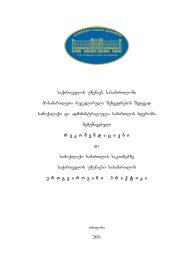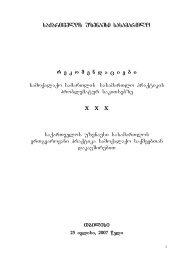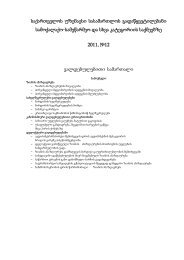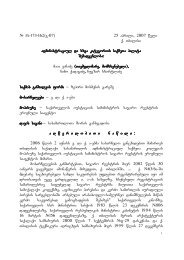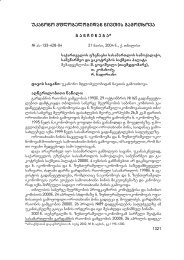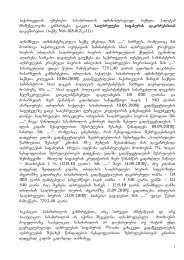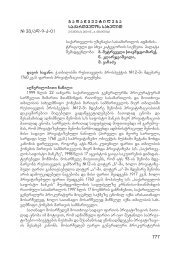saqarTvelos generaluri prokuratura
saqarTvelos generaluri prokuratura
saqarTvelos generaluri prokuratura
Create successful ePaper yourself
Turn your PDF publications into a flip-book with our unique Google optimized e-Paper software.
doqtorantTa forumiThe second category entails cases concentration camp, where the perpetrators are mostly or administrativepersonal. According to the Yugoslavia Tribunal, the perpetrator must be aware of the criminal character ofthe system and act with intent to further it.The third category, named extended form, concerns the attribution of criminal responsibility for crimescommitted by other participants exceeding the framework of the common plan.According to abovementioned under first two categories the participants are responsible for crimescommitted within the framework of the common plan; the third category of joint criminal enterprise goesbeyond the framework of the common plan. While the actus reus can be the same for each of the threecategories, they differ in respect of the mens rea.Commission is characterized with two elements: “committing” and “jointly with another”. It entails bothan objective and a subjective element. Objective element means the contribution to the physical commissionof the crime, subjective element - an agreement between the co-perpetrators. 14 While the definition of abovementioned elements will be clearly established, its interpreting is different in various national legal orders.According to Article 25 (c) of ICC Statute joint commission requires the highest level of individualcriminal responsibility. For joint commission the existence of actus reus and mens rea are necessary. Actusreus and mens rea provides some interpretations of different elements of commission, that are different fromthe case law of ad hoc Tribunals.Actus reus of joint commission means the existence of a group of person, common plan and the contributionof the accused within the common plan. As for mens rea, all persons committing crime, should act with theexistence of mental element. In comparison with the concept of joint commission defined by ICTY case lawabovementioned concept is more specific in relation with actus reus and mens rea.If the perpetrator uses another person as an instrument to commit a crime under international law, this isa basis for criminal responsibility under Article 25(3)(a) of the ICC Statute. This type of commission isrecognized by the major legal systems in the world. However, before the ICC Statute entered into force, theresponsibility for perpetrator -by-means had not been regulated neither by international criminal law nor byinternational courts.Criminal responsibility under Article 25(3)(a) is independent regardless of whether that other person iscriminally responsible. Under the norm a perpetrator-by-means can be liable if the direct perpetrator is notresponsible, for example, if he or she is not yet of legal age. This norm implies the concept of the “perpetratorbehind the perpetrator”, what means that the direct perpetrator can be manipulate.. This doctrine wasrecently used by the German Supreme Court in the cases of the killings at the inner-German border between1961 and 1989.ICC Statute doesn‚t regulate the commission of crime by omission. ICC Statute drafts included suchnorm, but finally it didn‚t become part of the ICC Statute, as some states, especially France, expressedserious reservations about establishing general liability for omissions.However, there is no doubt that in certain circumstances, a simple omission can cause a crime underinternational criminal law. One example relates to command responsibility under Article 28; the basis forcriminal liability in this case is the failure to prevent or to report a crime under international law.Case Law of the ad hoc Tribunals (both the Yugoslavia and the Rwanda Tribunals) determined thatliability can arise from omission. In treaty law, Article 86 of Additional Protocol I provides that breaches ofthe Geneva Conventions can result “from failure to act when under a duty to do so” as well as from acting 15 .Furthermore, some of the Nuremberg follow-up trials also recognized criminal responsibility for omission.Finally, liability for omission can be qualified as a general principle of law, as comparative analysis showsthat with the exception of French law, almost all legal cultures establish such liability. 1614Judgment, Tadic (IT-94-1-A), Appeals Chamber, 15 July 1999, paragraph 227.15Werle G., Individual Criminal Responsibility in Article 25 ICC Statute, “Journal of International CriminalJustice”, 2007, p. 958.16Additional Protocol I of Geneva Conventions, article 86.102



